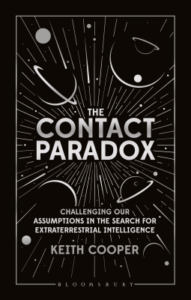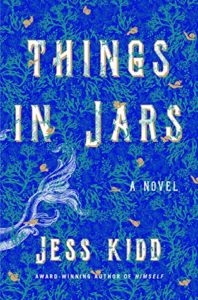
 Title: The Contact Paradox: Challenging our Assumptions in the Search for Extraterrestrial Intelligence by Keith Cooper
Title: The Contact Paradox: Challenging our Assumptions in the Search for Extraterrestrial Intelligence by Keith Cooper
Published by Bloomsbury SIGMA
Published: January 21st 2020
Genres: Science
Pages: 336
Format: ARC
Source: Netgalley
Goodreads
Inside the difficult questions about humanity's search for extraterrestrial intelligence.
What will happen if humanity makes contact with another civilization on a different planet? In The Contact Paradox, space journalist Keith Cooper tackles some of the myths and assumptions that underlie SETI--the Search for Extraterrestrial Intelligence.
In 1974 a message was beamed towards the stars by the giant Arecibo telescope in Puerto Rico, a brief blast of radio waves designed to alert extraterrestrial civilizations to our existence. Of course, we don't know if such civilizations really exist. But for the past six decades a small cadre of researchers have been on a quest to find out, as part of SETI, the search for extraterrestrial intelligence.
The silence from the stars is prompting some researchers, inspired by the Arecibo transmission, to transmit more messages into space, in an effort to provoke a response from any civilizations out there that might otherwise be staying quiet. However, the act of transmitting raises troubling questions about the process of contact. We look for qualities such as altruism and intelligence in extraterrestrial life, but what do these mean to humankind? Can we learn something about our own history when we explore what happens when two civilizations come into contact? Finally, do the answers tell us that it is safe to transmit, even though we know nothing about extraterrestrial life, or as Stephen Hawking argued, are we placing humanity in jeopardy by doing so?
In The Contact Paradox, author Keith Cooper looks at how far SETI has come since its modest beginnings, and where it is going, by speaking to the leading names in the field and beyond. SETI forces us to confront our nature in a way that we seldom have before--where did we come from, where are we going, and who are we in the cosmic context of things? This book considers the assumptions that we make in our search for extraterrestrial life, and explores how those assumptions can teach us about ourselves.
I am not a science-minded person and a lot of upper-level math boggles my mind, but I
do love reading
about science, especially space and astrophysics and what lies beyond our atmosphere. When I had the opportunity to read
The Contact Paradox by Keith Cooper, I jumped on it, because I love the idea of examining what it means to achieve contact with extraterrestrials.
I really loved how Cooper presented his argument, circled back around to clarify and reiterate, and also used pop culture and science fiction references to illustrate some of the ideas about which he wrote. It’s not an easy book to read, but it is accessible and is not full of unexplained jargon so that a casual science reader like myself could pick it up, understand the concepts about which he wrote, and enjoy it. I think writing about a very specialized, specific field in a way that makes it accessible to people on the other side of the field is a difficult task, and I thoroughly enjoyed this from beginning to end.
Two quotes (taken from an unfinished copy, so they may be different in the final versions) really stuck to me that I ended up writing them down in my notebook illustrate the concept of the Contact Paradox:
… maybe the civilisations that last are the ones that keep their heads down and out of trouble. On the other hand […], maybe what other civilisations are looking for as evidence that we are stepping up and becoming a good galactic civilisation is a willingness to reach out, and maybe there are implications if we choose not to. This is the dichotomy at the heart of the Contact Paradox. It is a maze of assumptions, cherished beliefs and few facts.
SETI [the Search for Extraterrestrial Intelligence] is not just a search for aliens. It’s also a search for ourselves. We project our hopes and fears, our history and our expectations about the future of humanity onto what we think extraterrestrial civilisations might be like. The stars are a mirror and, when we gaze up at them, if we look closely enough, we see our reflection staring back. Study that reflection and we may learn something about ourselves.
The concept of extraterrestrial life is big in science fiction, and when I taught science fiction, I always liked to include bits like this (not so eloquently put, but I wanted to get my students thinking about what extraterrestrial life in fiction meant). Often times, in fiction, when characters go out exploring within the narrative laid out for them, they’re not always just searching for something else or the other. A lot of the times they’re also searching for themselves and their meaning within the greater context of their world, and the struggle in searching for themselves is that to themselves they must find definition. Who am I? Who are we? Who do I want to be? These and similar questions are also faced in the context of what it means to actually seek out or receive communication and visits from other planets and whether or not that’s possible in our lifetimes or any near-future lifetimes. And if it isn’t possible, then what? Then who are we?
Thank you to Bloomsbury for a gifted digital ARC! All opinions are my own.



 Title:
Title:  Title:
Title: